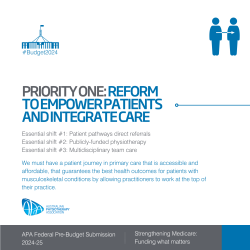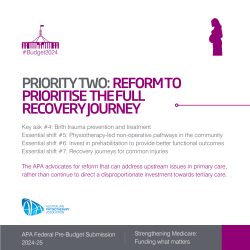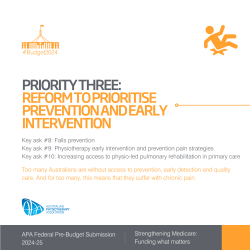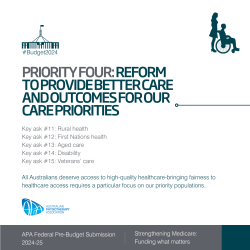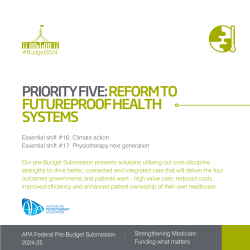Our healthcare needs have evolved, it’s time to reflect this change
We're breaking down our 2024-25 Federal Budget submission, including the top five priority reforms across integrating care, the full recovery journey, prevention and early intervention, underserviced demographics and the next generation of the physiotherapy workforce.
Our current system leaves people waiting too long for the care they need. Barriers to direct referral increase costs and delay access to essential care. Funding a system where physiotherapists can directly refer patients to specialists will speed up patient care and ensure timely interventions to reduce unnecessary delays.
Publicly funded physiotherapy means more than just access; it means empowerment, prevention, and the opportunity for everyone to reach their highest level of health and wellbeing. First Contact Physiotherapy practitioners can manage musculoskeletal conditions effectively to reduce the load on GPs in primary care. Importantly, as first contact professionals, physiotherapists have the experience, skills and clinical reasoning abilities to diagnose musculoskeletal conditions and determine appropriate care pathways.
Funding multidisciplinary teams allows for comprehensive care that addresses all aspects of a patient's health, improving outcomes through collaborative expertise. These essential shifts represent a more integrated, accessible, and effective approach to healthcare. By embracing direct referrals, publicly funded physiotherapy, and multidisciplinary care, we pave the way for a healthier Australia.
Untreated physical birth trauma has direct long-term and debilitating impacts on almost every facet of daily life. Expert pelvic health physiotherapy can greatly reduce the risks associated with childbirth, supporting birthing parents to recover more quickly and with less discomfort. We're calling for funding and support for expert pelvic health physiotherapy to be available for all birthing parents. This isn't just about treating birth trauma—it's about preventing it, ensuring every family has the best start.
Imagine managing pain and healing injuries without immediate surgery. Through targeted physiotherapy, we address conditions directly at their source, reducing the need for surgical interventions. These pathways aren't about avoiding surgery; they're about embracing a holistic approach to health, focusing on recovery and rehabilitation that's tailored to the patient, within their community.
By preparing patients for medical procedures with physiotherapy, we ensure better post-surgery outcomes, shorter hospital stays and quicker recoveries. There is significant opportunity within physiotherapy to leverage existing skill sets and scope, addressing system inefficiencies in primary care and directing care away from more costly medical interventions.
Australians deserve simpler and faster recovery journeys from common injuries—particularly musculoskeletal injuries, where an integrated pathway to transition smoothly from injury to recovery is significantly lacking. Strengthening Medicare means ensuring that recovery journeys for common injuries such as meniscal and rotator cuff injuries are funded. Imagine a future where every step of the recovery journey is supported by a team of professionals dedicated to your overall well-being.
Every year, falls rob many older Australians of their independence and mobility. Physiotherapy-led exercise programs can significantly reduce the risk, enhancing stability and confidence among seniors. Falls aren’t just accidents; they’re preventable. With physiotherapy-led falls prevention programs, we can significantly reduce the risk, ensuring our seniors live safer, more active lives. Falls do not have to be an inevitable part of growing older.
Early physiotherapy intervention goes beyond treating symptoms; it's about identifying risk factors and implementing strategies that prevent chronic pain from developing. With the right support and guidance, individuals can maintain their mobility, strength, and overall well-being. By investing in and advocating for physiotherapy early intervention and prevention pain strategies, we’re not just treating pain; we’re preventing it. We’re giving people the tools they need to lead healthier, happier lives.
Chronic obstructive pulmonary disease (COPD) is a preventable and treatable lung disease—with early diagnosis and treatment, patients can breathe better and live healthier lives. Pulmonary rehabilitation, led by skilled physiotherapists, offers a lifeline for COPD. Physiotherapists are well trained in cardiorespiratory management and chronic care but are currently under-utilised in primary care. Physiotherapy-led exercise prescription is a key component of pulmonary rehab programs, but it remains underfunded. It's time to change that.
All Australians deserve access to high-quality healthcare—bringing fairness to healthcare access requires a particular focus on our priority populations. In rural areas, distances are vast, and healthcare services are often stretched thin. Physiotherapy, a critical service for many health conditions, is not always readily accessible. By offering rebated physiotherapy services and creating incentives for physiotherapists to work in rural settings, we can significantly improve healthcare access and outcomes for rural Australians. Every Australian, no matter their postcode, deserves quality physiotherapy services.
Culturally safe physiotherapy isn’t a luxury; it’s a necessity. For First Nations peoples, accessing healthcare that respects these aspects is crucial. For many First Nations people, these services are out of reach, contributing to disparities in health outcomes. By funding and prioritising physiotherapy that’s accessible and culturally informed, we can help close the gap.
Our ageing Australians in aged care benefit greatly from physiotherapy, which helps maintain mobility and independence, significantly reducing fall risks, maintaining mobility and managing complex pain, continence and the symptoms of dementia. Healthy ageing is key. We can maintain and improve the quality of life of people aged 65 and over by ensuring early and ongoing access to physiotherapy-led programs that improve function and reduce falls.
People with disabilities can achieve better autonomy and life quality through tailored physiotherapy, empowering them towards more active participation in society. All Australians living with disability must have access to the physiotherapy supports they need to maintain and improve function and participation, inside and outside the National Disability Insurance Scheme (NDIS).
This tailored care must be extended to our veterans, who deserve physiotherapy to address their physical and emotional wounds sustained through their service. Leaving physiotherapy behind leaves veterans behind. Measures are needed to improve and streamline coordination of musculoskeletal care for veterans, to reduce the burden on general practice and to reduce ongoing low-value care.
All Australians deserve access to high-quality healthcare—bringing fairness to healthcare access requires a particular focus on our priority populations.
Physiotherapists, like other healthcare professionals, are experiencing the impacts of climate change on their environments, patients, professional practice and workplaces. Like all healthcare professionals, physiotherapists have a role to play in adaptation—by building climate-resilient health systems—and in mitigation. They are well placed to advocate for climate action at all levels.
Ensuring a robust future for physiotherapy starts with creating positive early experiences for students. This includes providing them with valuable opportunities to contribute to patient care during clinical placements. But to truly secure our future, significant investment is needed. A national allied health workforce strategy, investments in our training pipelines, and legislative changes to support clinical supervision are critical to help overcome these barriers for our next generation of practitioners and ultimately, patients we treat.
Read the whole APA Federal Pre-Budget submission.
Read 14 May 2024 media release: Federal Budget lacks vision Australia needs for a healthy and prosperous future

